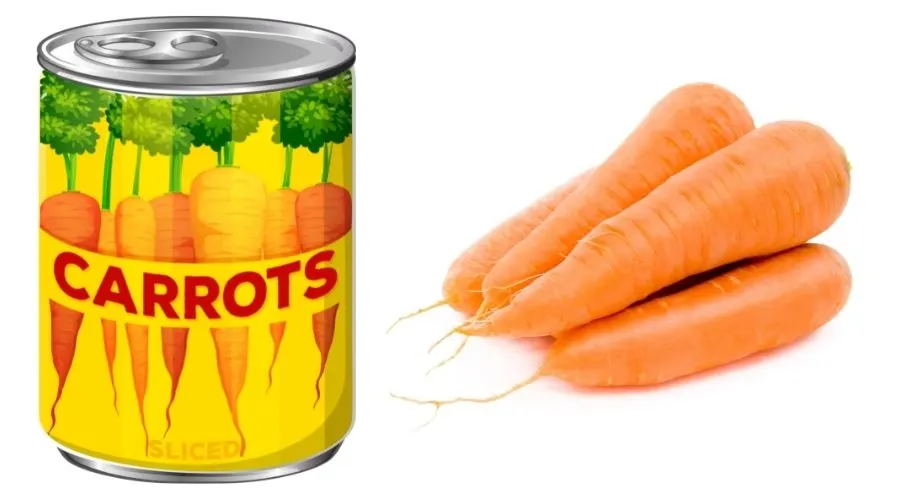Canned vegetables can be a useful store cupboard addition for those times when you don’t have any fresh or just want a quick alternative without the prep.
Canned vegetables sometimes have a bad reputation, and it’s thought they’re lacking when it comes to quality and nutrition, but is there really that much of a difference between canned and the fresh alternative?
The short answer is that fresh carrots are higher in most vitamins and minerals than canned. However, canned carrots are still a good source of many nutrients, and in most cases, the differences are small. Canned carrots are quicker to prepare and can be stored for longer.
Read on to find out much more about the calorific and nutritional differences between canned and fresh carrots and the differences in storage and use.
Also in This Article
In a hurry or looking for something specific? Use the links below to jump to the relevant section:

Canned Vs. Fresh Carrots Nutritional Comparison
In this section, I’ll be comparing the nutritional differences between canned and fresh carrots in various categories. To ensure the comparison is accurate, it will be weight for weight and based on data from the USDA.
The comparison is between canned carrots, canned without salt and drained, vs. cooked fresh carrots, boiled without salt. I’m comparing cooked carrots and not raw is because canned carrots are cooked in their cans as part of the canning process.
Calorie Comparison
Both canned and fresh carrots are low in calories, but USDA data confirms that canned carrots contain slightly fewer calories per 100g than fresh carrots.
The reason why canned carrots are lower in calories than the fresh version is that the water content is higher, and they’re lower in carbs, sugar, and fiber.
Canned carrots contain 93g of water per 100g, whereas fresh carrots contain 90g of water, which shows some absorption during the canning process.
| Carrot Type | Calories Per 100g |
| Canned Carrots | 25kcal |
| Fresh Carrots (cooked) | 35kcal |
Nutritional Comparison
Fresh (cooked) carrots retain more nutrients than canned carrots meaning they’re higher in carbohydrates, sugars, fiber, and protein; however, in most cases, there’s not much difference between the two.
| Nutrition Type | Canned Carrots | Fresh Carrots (cooked) |
| Carbohydrates | 5.54g | 8.22g |
| of Which are Sugars | 2.48g | 3.45g |
| Dietary Fiber | 1.5g | 3g |
| Fat | 0.19g | 0.18g |
| Protein | 0.64g | 0.76g |
| Sodium/Salt | 42mg | 58mg |
Vitamins & Minerals Comparison
When you compare the vitamins and minerals of canned carrots and fresh carrots side-by-side, you can see that fresh carrots contain higher levels of nutrients in most categories, although in many cases, the difference is minimal.
Canned carrots still contain many vitamins and minerals and are a good source of vitamin A, potassium, vitamin C, and many more.
| Vitamin/Mineral Type | Canned Carrots (per 100g) | Fresh Carrots (per 100g) |
| Calcium | 25mg | 30mg |
| Iron | 0.64mg | 0.34mg |
| Phosphorus | 24mg | 30mg |
| Potassium | 179mg | 253mg |
| Magnesium | 8mg | 10mg |
| Thiamin | 0.018mg | 0.066mg |
| Riboflavin | 0.03mg | 0.044mg |
| Vitamin B6 | 0.112mg | 0.153mg |
| Vitamin C | 2.7mg | 3.6mg |
| Vitamin A | 558mcg | 852mcg |
| Vitamin E | 0.74mg | 1.03mg |
| Niacin | 0.552mg | 0.645mg |
| Zinc | 0.2mg | 0.2mg |
*mcg = microgram (1000th of a milligram) / mg = milligram (1000th of a gram)

Canned Vs. Fresh Carrots Use Comparison
The primary use for canned carrots is an alternative to fresh carrots as a vegetable side dish, but they’re also perfect for adding to casseroles, curries, and soups where you don’t have much time for prep.
Canned carrots are pre-cooked, so they’re not so good in recipes where you need raw carrots; for example, in carrot cake where you need to grate or shred carrots, you can’t replace them with canned.
It’s also a good idea to check the ingredients of canned carrots because some contain added salt and sugar, which might impact the flavor of certain recipes.
Preparation Differences
Canned carrots are usually sliced, but in some cases, they’re whole baby carrots. They take little preparation and just require draining and heating by adding them directly to a casserole or soup, cooking in a pan of boiling water, or they can be microwaved.
Fresh carrots require a little more prep, and in most cases, the top and bottom need to be removed, the outer skin needs to be peeled away, and the carrot needs to be cut into pieces that are most appropriate for the dish that you’re making.
Storage and Availability
Both canned and fresh carrots are readily available in most grocery stores, although fresh carrots are more popular and generally sold in larger volumes.
Although fresh carrots can be stored for a few weeks or even a month in a refrigerator under the right conditions, canned carrots can be stored in a cool dark cupboard or pantry for up to three years (preferably before the use-by date).
Best for Flavor/Texture
Judging which kind of carrot tastes best is something best decided by completing a poll to get a general public opinion.
Please help us out by voting for your favorite kind of carrot (canned or fresh), and once you vote, the winner so far will be revealed (no personal information is required to vote).
Summary
We’ve now compared canned carrots against fresh carrots in various categories, and here’s a summary of the key differences:
- Canned carrots are slightly lower in calories because they contain more water and fewer carbs and sugars.
- Fresh cooked carrots are slightly higher in most vitamins and minerals.
- Canned carrots are pre-cooked and are quick to prepare and heat; however, they can’t be used as a replacement for a raw carrot.
- Canned carrots can be stored for much longer than fresh carrots.
More Canned Vs. Fresh Carrots FAQs
Although canned carrots contain a wide range of nutrients, they can’t be classed as healthier than fresh carrots which have higher levels of vitamins and minerals in most nutrient categories.
Yes, canned carrots contain vitamins and minerals although, in slightly lower amounts than fresh carrots, they’re still a good alternative to keep in your store cupboard.
Related Articles
I hope this article has helped you to find the information you were looking for; you might also find the following articles helpful too:
What’s the Difference Between Creamed Corn and Sweet Corn?
Peas – Fresh, Frozen, or Canned (Which Are Best?)
Canned Potatoes Vs. Fresh (What’s the Difference?)
References Used for this Article
To ensure the nutritional information used in this article is accurate, I have used data from the UDSA FoodData Central; the links below contain the source information:
USDA FoodData Central Canned Carrots (drained without salt)
USDA FoodData Central Carrots (Boiled & drained without salt)
